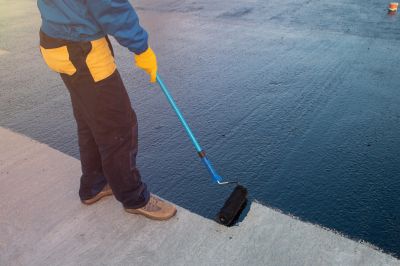Expert Picks for High-Performance Roof Coatings Solutions
Discover a curated selection of premium roof coating products that deliver superior weather resistance and easy application.
 Roof coatings are specialized materials designed to protect and extend the lifespan of roofing systems. They serve as a protective barrier against weather elements such as rain, snow, and UV rays, helping to prevent leaks and structural damage. These coatings come in various formulations, including liquid membranes, elastomeric coatings, and reflective coatings, each suited for different roofing materials and conditions. Selecting the right roof coating involves understanding the specific needs of your roof, such as its material, age, and exposure level. Proper application and maintenance can significantly enhance the durability and performance of a roof over time.
Roof coatings are specialized materials designed to protect and extend the lifespan of roofing systems. They serve as a protective barrier against weather elements such as rain, snow, and UV rays, helping to prevent leaks and structural damage. These coatings come in various formulations, including liquid membranes, elastomeric coatings, and reflective coatings, each suited for different roofing materials and conditions. Selecting the right roof coating involves understanding the specific needs of your roof, such as its material, age, and exposure level. Proper application and maintenance can significantly enhance the durability and performance of a roof over time.
Top Overall Option
Elastomeric Roof Coating
Elastomeric roof coatings are highly regarded for their flexibility and durability, making them suitable for a variety of roofing surfaces. They form a seamless, waterproof membrane that can expand and contract with temperature fluctuations, reducing the risk of cracks and leaks. These coatings often feature reflective properties that help in reducing heat absorption, potentially contributing to lower energy costs. When properly applied, elastomeric coatings can enhance the longevity of a roof by providing a resilient protective layer that withstands weathering and aging.
Types of Products For Roof Coatings
Acrylic Roof Coatings
Water-based and easy to apply, acrylic coatings are known for their UV resistance and reflective qualities, suitable for various roof types.
Rubberized Coatings
Flexible and waterproof, rubberized coatings are ideal for sealing leaks and protecting surfaces from moisture.
Silicone Roof Coatings
Highly waterproof with excellent UV resistance, silicone coatings are often used on flat and low-slope roofs.
Polyurethane Coatings
Durable and resistant to chemicals and abrasion, polyurethane coatings are suitable for industrial and commercial roofs.
Bitumen Coatings
Traditional asphalt-based coatings that provide waterproofing and protection for built-up roofing systems.
Reflective Coatings
Designed to reflect sunlight and reduce heat absorption, these coatings can help in energy savings.
Elastomeric Coatings
Flexible coatings that accommodate roof movement, reducing cracking and leaks.
Liquid Membrane Coatings
Seamless, waterproof coatings that can be applied to complex roof geometries.
Polymer-Modified Coatings
Enhanced with polymers for added flexibility and adhesion, suitable for diverse roofing materials.
Aluminum Coatings
Reflective and protective, often used on metal roofs to prevent corrosion and heat buildup.
Popular Choices
Widely used for their ease of application and UV resistance, suitable for many roofing surfaces.
Popular for their waterproofing and UV durability, often chosen for flat roofs.
Favored for their flexibility and weather resistance, suitable for various climates.
Effective for sealing leaks and providing waterproof protection on different roof types.
Chosen for their ability to reflect sunlight and help reduce cooling costs.
Known for their durability and chemical resistance, often used in industrial settings.
Valued for creating seamless waterproof layers on complex roof surfaces.
Popular for metal roofs due to their reflective properties and corrosion resistance.
Traditional choice for waterproofing built-up roofing systems.
Enhanced with polymers for additional flexibility and adhesion across various substrates.
Different types of roof coatings offer unique benefits. For instance, elastomeric coatings are valued for their flexibility, allowing them to expand and contract with temperature changes without cracking. Reflective coatings can reduce heat absorption, potentially lowering cooling costs. Some coatings are designed to adhere to a wide range of substrates, including metal, asphalt, and modified bitumen, providing versatile options for various roofing systems. It is important to consider the compatibility of the coating with your existing roof material to ensure optimal adhesion and protection.
Application methods vary from brush and roller to spray systems, depending on the product type and project scale. Proper surface preparation, such as cleaning and repairing existing damage, is crucial for achieving good adhesion and long-lasting results. Regular inspections and timely reapplications can help maintain the roof’s integrity, preventing minor issues from developing into costly repairs. While choosing a roof coating, consider factors like ease of application, drying time, and the presence of any VOC (volatile organic compound) restrictions, especially in enclosed spaces. Overall, investing in the right roof coating can contribute to the longevity and performance of your roofing system, providing peace of mind and protection for years to come.
Key Buying Considerations
- Compatibility with existing roof material to ensure proper adhesion.
- Weather resistance properties suitable for your climate conditions.
- Ease of application, including tools required and drying time.
- Reflective qualities that may influence energy efficiency.
- Flexibility and ability to accommodate roof movement without cracking.
- Waterproofing capabilities to prevent leaks and moisture intrusion.
- VOC content and safety considerations during application.
- Durability and expected lifespan of the coating under typical conditions.
- Cost and coverage rate per gallon or container.
- Maintenance requirements and reapplication frequency.
- Resistance to UV rays to prevent degradation over time.
- Ability to seal minor cracks and surface imperfections.
- Compatibility with other roofing materials or coatings already in place.
- Environmental conditions during application, such as temperature and humidity.
- Warranty options or manufacturer guarantees for performance.
This content may contain affiliate links. We may earn a commission if you make a purchase through these links at no additional cost to you.
